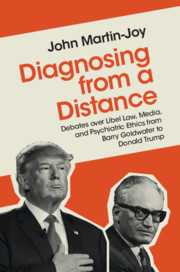 Diagnosing from a Distance
Diagnosing from a Distance Provocateur
from Part I - Diagnosis from a Distance and Libel Law in the 1960s: Goldwater v. Ginzburg
Published online by Cambridge University Press: 29 February 2020
In this chapter, I show how the infamous Fact magazine episode of 1964 began. What motivated Ralph Ginzburg to publish his “survey” of psychiatrists and to create a psychological profile of Barry Goldwater? I reassess Ginzburg’s controversial but now almost forgotten career as a provocateur and alleged pornographer (a charge that conservative politicians made loosely, based on his conviction for distributing the highbrow Eros magazine). Ginzburg remained committed to free speech and journalistic freedom in an era when television, newspapers, and direct mail advertising were flourishing. But was the survey ethical? Was Goldwater mentally ill and a danger to the country, as Ginzburg and many psychiatrists claimed? I make use of rarely explored sources, including the transcript of the Goldwater v. Ginzburg libel case, Ralph Ginzburg’s papers, and an original interview with Fact managing editor Warren Boroson. In an era when the Supreme Court decision in New York Times v. Sullivan had dramatically loosened libel law and established a new standard for libel called “actual malice,” Ginzburg had every reason to believe he might prevail in the courts, and in the court of public opinion.
To save this book to your Kindle, first ensure no-reply@cambridge.org is added to your Approved Personal Document E-mail List under your Personal Document Settings on the Manage Your Content and Devices page of your Amazon account. Then enter the ‘name’ part of your Kindle email address below. Find out more about saving to your Kindle.
Note you can select to save to either the @free.kindle.com or @kindle.com variations. ‘@free.kindle.com’ emails are free but can only be saved to your device when it is connected to wi-fi. ‘@kindle.com’ emails can be delivered even when you are not connected to wi-fi, but note that service fees apply.
Find out more about the Kindle Personal Document Service.
To save content items to your account, please confirm that you agree to abide by our usage policies. If this is the first time you use this feature, you will be asked to authorise Cambridge Core to connect with your account. Find out more about saving content to Dropbox.
To save content items to your account, please confirm that you agree to abide by our usage policies. If this is the first time you use this feature, you will be asked to authorise Cambridge Core to connect with your account. Find out more about saving content to Google Drive.